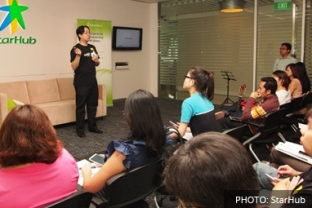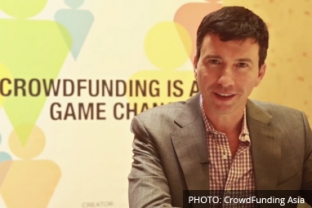Crowdfunding in Singapore Catching on Fast
|
TRENDS: CROWDFUNDING in Singapore is growing fast, with millions raised by Singapore-based campaigns in the past eight months alone. But whether this can be sustained and become a powerful fund-raising tool for Singapore-based start-ups remains to be seen.
According to crowdfunding platform Crowdonomic.com, a record amount of money has been raised by Singapore-based campaigns this year, and this amount doubles on a monthly basis. The number of Singapore-based supporters is growing as well. In March, Singaporean film The Body raised US$29,050 via global platform Indiegogo. In April, senior-friendly smartphone Silverline bagged US$54,001. And the following month, US$107,730 was pledged to the S377A Constitutional Challenge. But some observers are cautious about continued high-octane growth, citing Singapore's small market and slow adoption rates as limitations to crowdfunding's potential. But they agree there is a role for crowdfunding in Singapore as it can complement venture capitalists (VC) in supporting start-ups. Crowdfunding, which has more than 800 global online platforms today, allows anyone to raise funds for anything – profit ventures, creative ideas or personal needs – in exchange for rewards. A campaigner sets a funding goal and deadline. If people like the campaign, they can pledge money to make it happen. "As of now, crowdfunding here is very much in its infancy stage. It is still a fairly new concept to non-techies since its introduction in 2012," said Kelvin Koh, co-founder of PixBento, a photo-sharing app and Singapore's top crowdfunded campaign (US$3,220 raised) on a local platform.
Pirate3D, having raised US$1.44 million for its 3D printer The Buccaneer, is Singapore's top crowdfunded campaign on a global platform. It is also the only Singapore-based company that earned a spot (No 20) on Entrepreneur Magazine's 2013 list of Top 100 Crowdfunded Companies. "Apart from Pirate3D, I don't think there has been any other high-profile product or service that got funded," said Julian Low, entrepreneur-in-residence at Red Dot Ventures. "Most other campaigns from Singapore have small goals attached and thus expect small successes," said Mohamed Rushdy, co-founder of crowdsourcing learning portal Twofold. "Additionally, the Singapore market is far too small for a business model that crowdsources funds or talent to be sustainable." Jeffrey Paine, founding partner at Golden Gate Ventures (GGV), agreed: "The density of interesting projects coming from Singapore is limited." One reason for this, said Mr Koh, is that software start-ups – the bulk of tech start-ups here – are unlikely to crowdfund because of the low financial requirements in building a website or app. "Local culture also differs from that in the US. Asians in general fear failure and will perceive risks in funding an idea or project online," said Ben Chew, founder of HR consulting firm Startup Jobs Asia. "I don't think crowdfunding has really even taken off in Singapore. Even within the start-up community and early adopters, the buzz is somehow missing," said Alok Mishra, co-founder of B2B mobile advertising app Notiphi. "I think the problem lies in the fact that (No 1 platform) Kickstarter is a lot larger than the next biggest platform. And Kickstarter requires you to have a US or Canadian presence, so it's disadvantageous to non-Western tech companies, many of which are innovative and competent in their own right," Mr Low said. To address this gap, more crowdfunding platforms have been staking their presence here to attract local campaigners. Singapore-based platforms ToGather.Asia and Crowdonomic.com launched in 2012 and 2013. Australia's Pozible will be setting up office here in December, said its co-founder, Alan Crabbe. "Our focus is helping to build a strong creative industry in Asia, and we feel Singapore is fast becoming a creative capital," said Mr Crabbe. He cited the first ever-win at Cannes by a Singaporean, the country's art and writers festivals, and tech and creative projects as signs that Singapore's creative stature is rising. For Crowdonomic.com, its launch was driven more by a problem at home. "Early-stage capital formation is an extremely inefficient process in Singapore, and often businesses that get funded are those that have the best connections or luck, but not necessarily those that deserve funding the most," said founder-CEO Leo Shimada. "Crowdfunding solves this problem by making access to capital a more efficient and merit-based process." In short, it allows start-ups to experiment and test market demand, raise awareness, obtain feedback to improve or validate an idea, and acquire first followers and customers. "While the spirit of giving – which is at the core of crowdfunding – has always been strong in Singapore, crowdfunding growth has been supported by the increasing sophistication of platforms and quality of campaigns," he said. Jumping on the crowdfunding bandwagon next is new local start-up Clickdrive, which plans to raise funds for its "next-generation open platform for smart driving apps" on Indiegogo. Said CEO Mark Sutheran: "The advantages of crowdfunding vs seed funding for consumer products derive from pitching your dream directly to the customer rather than via individuals who only focus on ROI (return on investment). We like the idea that the final product will be shaped very much by the audience for whom it is intended." On why he chose Indiegogo over a local platform, Mr Sutheran said the more established global platforms have a proven record of delivering "six and seven-figure campaign numbers". But for PixBento's Mr Koh, it was Crowdonomic.com's service orientation that distinguished it from traditional platforms, which are usually more focused on campaign listings. "Unlike the mainstream websites which are overcrowded, the guys behind Crowdonomic.com are proactive and always available for help. They regularly correspond with us on our progress and provide tips on how to run our campaigns more effectively," he said. "They also invite campaigners to their events, which leads to more local exposure and eyeballs on our start-up." Similarly, Pozible offers value-added services, such as custom feedback on campaigns, regular workshops and integration with multiple payment systems like Bitcoin. In fact, these help boost the Australian-based platform to one of the top three platforms globally, Mr Crabbe claimed. So, is crowdfunding likely to replace venture capital in the near future? Observers disagree, and say both are complementary tools especially for early-stage start-ups. Said Notiphi's Mr Mishra: "VCs come with resources who are knowledgeable about their respective fields in which they invest, and keep up with new developments in a systematic manner. It's just not possible for crowds to be equally well informed." "Crowdfunding for equity may impact traditional venture capital funding, but I don't think venture capital will be replaced," Mr Crabbe said. "VCs will still provide access to networks, mentorship and experienced entrepreneurs." "Venture capital rounds are getting larger and fewer, so for crowdfunding to raise hundreds of millions of dollars in funding – I doubt that would be possible," Mr Low said. But he also said his firm has funded a few Kickstarter and Indiegogo campaigns, in a sign that a new breed of VCs has emerged. According to Entrepreneur Magazine, as the number of crowdfunding platforms continues to rise and competition for investor attention intensifies, more VCs now spend time poring through online platforms to identify promising companies. "Start-ups could benefit most from a combination of crowdfunding, which brings the wisdom of the crowd, and top-tier VCs, who bring their wealth of business-building experience," said Mr Shimada. Concurring, Mr Koh said: "Crowdfunding is a good alternative to initial seed money and to jump-start a production from ideation without losing equity. But it's mostly a one-time relationship. VCs are there for the longer mile. Not only do they invest and become part-owners of the business, they advise and provide networks to potential customers, buyers and subsequent fundings if necessary." A start-up cannot crowdfund for the long run, he added. Ultimately, observers say there is growth potential for crowdfunding here, given its location at the centre of crowdfunding networks in Asia and the increased convenience in online spending. "But the result will not be immediate. More education of the public on crowdfunding first needs to be in place," said Startup Jobs Asia's Mr Chew. This article is taken from SingaporeTowkayZone.com (www.towkayzone.com.sg) |
|









